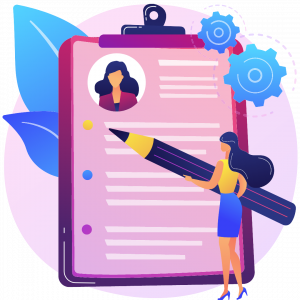THIS IS THE BEST WAY TO TALK ABOUT YOUR PROFESSIONAL CAREER ASPIRATIONS AT AN INTERVIEW

Not everyone has a career plan. In fact, a lot of us are just figuring things out as we go along. However, employers will be interested in learning about your career aspirations in an interview so it’s important you think about this beforehand.
Before going for a job interview, it’s a good idea to research any current development opportunities they might have. You could also look at the LinkedIn profiles of current employees to look at how easy/difficult it is to progress at the company.
To help you with your interview prep, our personal development goals for work examples are listed below:
- Develop a new skill
- Take up leadership responsibilities
- Learn more about other sides of the business that you might not have much exposure to day to day.
- Have a better work-life balance
- Strengthen your leadership skills
- Be open to learning new things
- Learn to be more resilient
- Become a more effective communicator

Where do you see yourself in five/ten years?
You can answer this question as ambitiously as you want, so long as it’s realistic. You also want to make sure that you’re relating your career development to the role you’ve applied for. If you’re interviewing for an entry-level job, you could say that you see yourself being a team leader within five years and manging a department within 10. If you’ve applied for a management interview, you could say you plan to be a department head in 10 years.
Whatever you decide your goals are, make sure they’re realistic and true to what you want.
What is your dream job?
Believe it or not, you don’t have to say that the job your applying for is your dream job. If you’re applying for a job that is stepping stone to that dream, you can tell them this. Be honest about your dream job and emphasize how this relates to you applying for this role. You could go one step further and talk about how the prospective employer could help you reach your goal.
What are your career goals?
Having career goals is important to a lot of companies. They want to know that you’re committed to your job and have a strong work ethic. We’ve included a list of example career goals above that you can use if you’re struggling to think of any but it’s always best to take it one step further by realising how you can reach that goal with the company you’ve applied for.
Who’s your mentor?
Pick someone who you can say a lot about and that you know well. For instance, if you pick someone who is famous, make sure you know enough information to defend why they’re your mentor if your questioned about it. If they’re your family or friend, prep an explanation as to why they’re your mentor so that the interviewer(s) can fully understand the impact they’ve had on you. Whoever you choose you need to have a good explanation for how they inspire you to work well and be better.
Potential employers are asking about career development to see if you’re self-motivated and driven. Asking yourself ‘what are your career aspirations’ will help you to pinpoint what you would expect from a company.
Both you and the interviewers want to see if their environment is the best for you to develop and grow in. Answer these questions honestly and with thought, showing that your career development is important and something that you have spent some time thinking about.
If you’re struggling to put a career plan together, you can start out by looking at the career development plan on the government website here.
If you’re ready to find your next job, search here to find jobs near you.